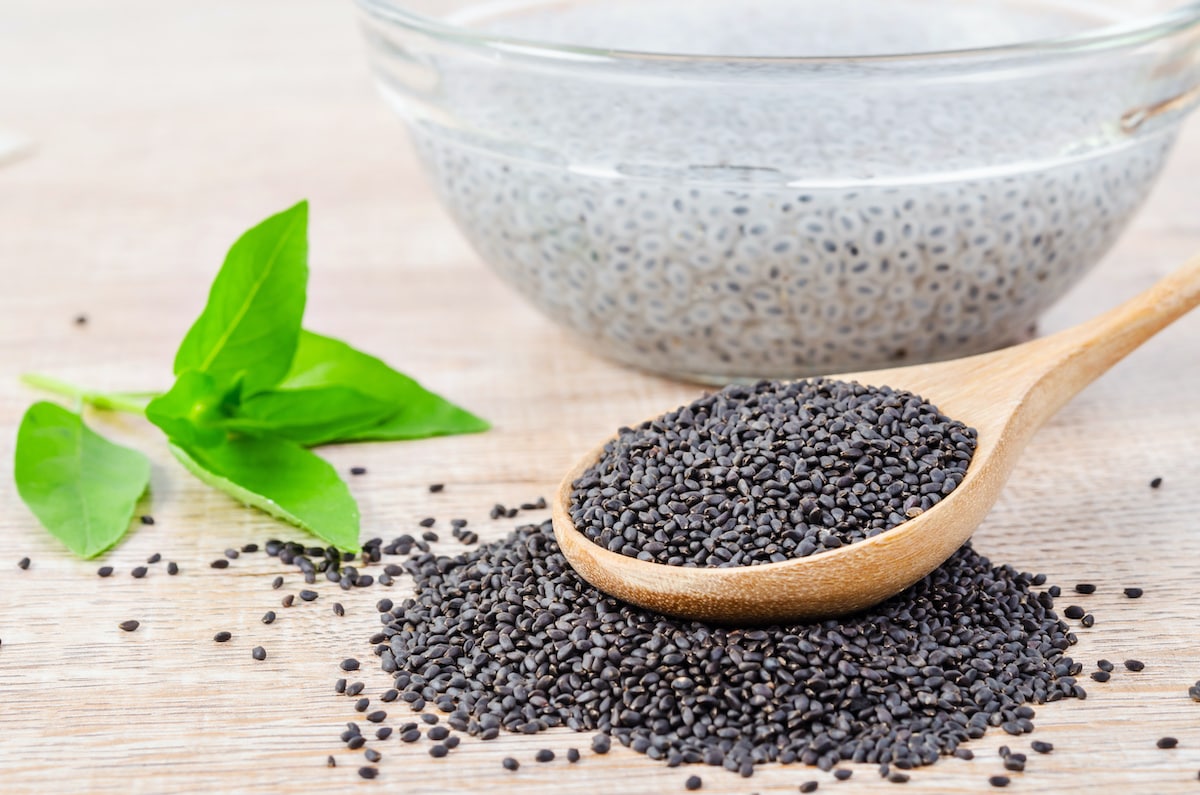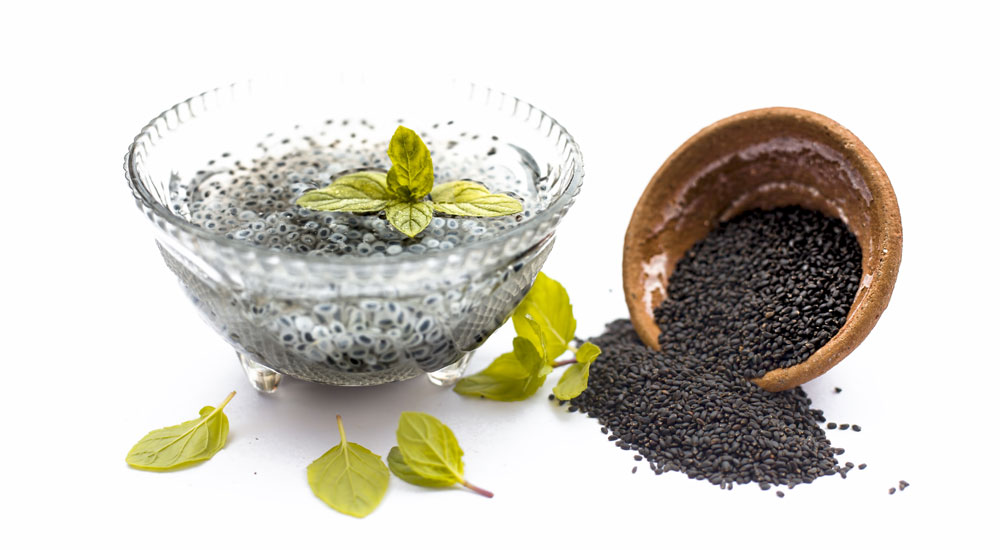When it comes to superfoods, basil is definitely a top contender. Not only are basil seeds high in fiber and other nutrients, they’re also packed with plant-based omega-3 fatty acids and beneficial plant compounds. Keep reading to learn more about the health benefits of basil seeds!
Benefits of Basil Seeds

Basil seeds are a powerful source of antioxidants, minerals, vitamins, and fiber. These beneficial nutrients can help improve your health in a variety of ways.
Basil seeds provide antioxidant benefits. Antioxidants protect cells from damage caused by free radicals, which are damaging chemicals that can cause cancer and other diseases.
Basil seeds also provide mineral benefits. Basil seeds are a good source of magnesium, potassium, and zinc. Magnesium helps maintain normal nerve function and regulates blood sugar levels. Potassium helps control blood pressure and fluid balance. Zinc is important for maintaining healthy skin and hair growth.
Basil seeds also provide vitamin benefits. Basil seeds are a good source of thiamin, niacin, vitamin B6, and vitamin C. Thiamin helps maintain energy levels and assist in the metabolism of food. Niacin is essential for the production of red blood cells and plays an important role in the body’s metabolic processes. Vitamin B6 helps to create new proteins and supports the immune system.* Vitamin C has anti-inflammatory properties*and aids in the formation of collagen.*
How to use Basil Seeds
Basil seeds are a great addition to your diet, and can used in many different ways. In this article, we will discuss how to use basil seeds in various recipes.
Basil seeds can added to salads or stir fries. They are also great additions to soups or stews. You can also make pesto with basil seeds, or use them as a flavor enhancer in food.
Basil seeds are high in antioxidants and vitamins, including vitamin A, vitamin C, and vitamin E. They are also high in dietary fiber and protein.
Basil is a powerhouse of nutrients, including antioxidants, vitamins, and minerals. Here’s how to use basil seeds to get the most out of this superfood:
To make a pesto, mix together 1 cup basil leaves, 2 cloves garlic, 1/4 cup olive oil or walnut oil, 1/2 teaspoon salt, and 1/4 teaspoon black pepper. For a tomato sauce, mix together 1/2 cup basil leaves, 3 cloves garlic, 1/4 cup olive oil or walnut oil, and 1/2 teaspoon salt.
Basil can also used in stir-fries and as a flavoring agent for soups and stews. Add 2 tablespoons chopped basil to vegetable broth or water for a flavorful base. Or add 1 tablespoon ground basil to oatmeal for added flavor.
The Health Benefits of Basil Seeds
Basil seeds are packed with health benefits and can be used in many different recipes. They are a great source of vitamin A, magnesium, copper, and potassium. Basil seeds can also help to improve digestion and boost the immune system.
Basil is a versatile herb that can used in many types of recipes. It can mixed into soups, stews, salads, or even smoothies. Basil is also a popular ingredient for flavoring food. You can use it to add flavor to sauces, dressings, or even as a dipping sauce for vegetables or bread.
One of the most important health benefits of basil seeds is their ability to improve digestion. Basil helps to reduce gas and bloating while promoting regularity. It has also shown to help reduce inflammation in the stomach and intestines.
Basil seeds are also a great source of vitamins A, magnesium, copper and potassium. These nutrients help to support overall health and well-being. Additionally, basil seeds contain antioxidants that protect against harmful chemicals and damage to cells caused by free radicals.
Timeline for Nutrition
The timeline for nutrition can broken into 3 general periods: prenatal, early life and late life. During prenatal development, the body is making most of its basic nutrients and minerals. In early life, the body continues to develop and grow, and is more susceptible to malnutrition. Late life is when many people start to age and their bodies start to break down, making it more difficult to get the nutrients they need.
Basil seeds have used for centuries as a culinary and medicinal herb.
The history of basil begins with its use in ancient Greece and Rome. Basil was thought to be a cure-all because of its antibacterial, antiviral, and antifungal properties. Basil was also used as a digestive aid and to help improve respiratory conditions.
In the Middle Ages, basil was used to treat epilepsy and other brain disorders. It was also used to improve circulation and ease pain. Today, basil is considered an effective remedy for sinus congestion, colds, flu symptoms, arthritis pain relief, skin problems such as psoriasis and eczema, stomach issues such as GERD (gastroesophageal reflux disease) and constipation relief.
The History behind Basil Seeds

Basil seeds have used as a culinary herb for centuries. This is thought to originate from India and was first cultivated in Crete. Basil was used as both a seasoning and medicine. The leaves and seeds were used in cooking, while the flowers were used as a perfume. Basil was also used as an aphrodisiac.
Basil seeds are high in antioxidants, including flavonoids, carotenoids, and terpenes. These antioxidants help protect the body against damage caused by free radicals. Basil also has anti-inflammatory properties, which can help relieve pain from arthritis and other conditions.
Basil is a great source of fiber, vitamins A and C, magnesium, and potassium. These nutrients can help improve digestion, provide energy, protect the heart, and support cell growth.
(Ocimum basilicum) has been used as a culinary herb for centuries, and its healing properties have been known since ancient times. This is most commonly known as the primary flavoring agent in pesto sauce, but it is also a powerful antioxidant and anti-inflammatory agent. Basil seeds are an excellent source of essential vitamins, minerals, and antioxidants, including vitamin A, vitamin C, magnesium, and manganese.
Basil seeds have a long history of use in traditional medicine.
Recipes using Basil Seeds
Basil is a popular herb with many health benefits, including antioxidant properties and anti-inflammatory effects. It can used in both sweet and savory recipes.
Basil seeds are a great source of nutrients, including vitamin A, antioxidants, dietary minerals such as calcium and magnesium, protein, and healthy fats. They are also high in fiber. When roasted or ground into a paste, basil seeds contain flavor and aromatics that can add depth to food.
Basil Seed Pesto: combine 1/2 cup basil seeds with 2 tablespoons olive oil, 1 clove garlic, 1/4 teaspoon salt, and 1/4 teaspoon black pepper in a food processor or blender; blend until smooth. Store in an airtight container in the fridge for up to 2 days.
Basil Seed Hummus: combine 2 cups chickpeas (or other bean), 3 cloves garlic, 1/2 cup tahini (sesame seed paste), 1/4 cup water or vegetable broth, 1 tablespoon fresh lemon juice, 3 tablespoons chopped fresh basil leaves, and 1 teaspoon sea salt in a food processor or blender; blend until smooth. Store in an airtight container in the fridge for up to 2 days.
Basil Seed Recipes:


1 Comment
Can you be more specific about the content of your article? After reading it, I still have some doubts. Hope you can help me. https://www.binance.com/join?ref=P9L9FQKY